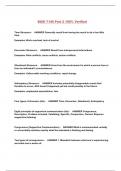BUSI 7140 Part 2 100% Verified
Time Stressors - ANSWER Generally result from having too much to do in too little
time.
Examples: Work overload, lack of control
Encounter Stressors - ANSWER Result from interpersonal interactions.
Examples: Role conflicts, issue conflicts, action conflicts
Situational Stressors - ANSWER Arise from the environment in which a person lives or
from an individual's circumstances.
Examples: Unfavorable working conditions, rapid change
Anticipatory Stressors - ANSWER Includes potentially disagreeable events that
threaten to occur, AKA haven't happened yet but could possibly in the future.
Examples: unpleasant expectations, fear
Four types of stressors (list) - ANSWER Time, Encounter, Situational, Anticipatory
Eight principles of supportive communication (list) - ANSWER Congruence,
Descriptive, Problem-oriented, Validating, Specific, Conjunctive, Owned, Requires
supportive listening
Congruence (Supportive Communication) - ANSWER What is communicated verbally
or nonverbally matches exactly what the individual is thinking and feeling
Two types of incongruence - ANSWER 1. Mismatch between what one is experiencing
and what one is aware of.
, 2. Mismatch between what one thinks or feels and what one communicates.
Evaluative communication - ANSWER Makes judgement or places label on other
individuals or their behavior
Descriptive communication - 3 Steps (Supportive communication) - ANSWER 1.
Describe objectively your observation of the event that occurred or the behavior that
you think needs to be modified.
2. Describe your (or others) reactions to the behavior or describe consequences of the
behavior
3. Suggest a more acceptable alternative
Problem-oriented (Supportive communication) - ANSWER Not person-oriented
Validating communication - definition and types (Supportive communication) -
ANSWER Helps people feel recognized, understood, accepted, and valued
1. Respectful, egalitarian - exact opposite of superiority-oriented communication
2. Flexibility - willing to listen to other person to understand that they may possess
additional data and other alternatives that may make a significant contribution
3. Two-way - implied result of respectfulness and flexibility
Invalidating communication - definition and types - ANSWER Arouses negative feelings
about self-worth, identity, and relatedness to others.
1. Superiority-oriented - communication can take the form of put-downs, which are said
t make the communicator look good and others bad. Includes one-upmanship, use of
jargon, or words that are used to exclude others
2. Rigidity - communication portrayed as absolute (know it all)
3. Indifference - other people's existence or importance not acknowledged
4. Imperviousness - does not acknowledge the feelings or opinions of other person
Specific communication (supportive communication) - ANSWER Useful; not global
Time Stressors - ANSWER Generally result from having too much to do in too little
time.
Examples: Work overload, lack of control
Encounter Stressors - ANSWER Result from interpersonal interactions.
Examples: Role conflicts, issue conflicts, action conflicts
Situational Stressors - ANSWER Arise from the environment in which a person lives or
from an individual's circumstances.
Examples: Unfavorable working conditions, rapid change
Anticipatory Stressors - ANSWER Includes potentially disagreeable events that
threaten to occur, AKA haven't happened yet but could possibly in the future.
Examples: unpleasant expectations, fear
Four types of stressors (list) - ANSWER Time, Encounter, Situational, Anticipatory
Eight principles of supportive communication (list) - ANSWER Congruence,
Descriptive, Problem-oriented, Validating, Specific, Conjunctive, Owned, Requires
supportive listening
Congruence (Supportive Communication) - ANSWER What is communicated verbally
or nonverbally matches exactly what the individual is thinking and feeling
Two types of incongruence - ANSWER 1. Mismatch between what one is experiencing
and what one is aware of.
, 2. Mismatch between what one thinks or feels and what one communicates.
Evaluative communication - ANSWER Makes judgement or places label on other
individuals or their behavior
Descriptive communication - 3 Steps (Supportive communication) - ANSWER 1.
Describe objectively your observation of the event that occurred or the behavior that
you think needs to be modified.
2. Describe your (or others) reactions to the behavior or describe consequences of the
behavior
3. Suggest a more acceptable alternative
Problem-oriented (Supportive communication) - ANSWER Not person-oriented
Validating communication - definition and types (Supportive communication) -
ANSWER Helps people feel recognized, understood, accepted, and valued
1. Respectful, egalitarian - exact opposite of superiority-oriented communication
2. Flexibility - willing to listen to other person to understand that they may possess
additional data and other alternatives that may make a significant contribution
3. Two-way - implied result of respectfulness and flexibility
Invalidating communication - definition and types - ANSWER Arouses negative feelings
about self-worth, identity, and relatedness to others.
1. Superiority-oriented - communication can take the form of put-downs, which are said
t make the communicator look good and others bad. Includes one-upmanship, use of
jargon, or words that are used to exclude others
2. Rigidity - communication portrayed as absolute (know it all)
3. Indifference - other people's existence or importance not acknowledged
4. Imperviousness - does not acknowledge the feelings or opinions of other person
Specific communication (supportive communication) - ANSWER Useful; not global


